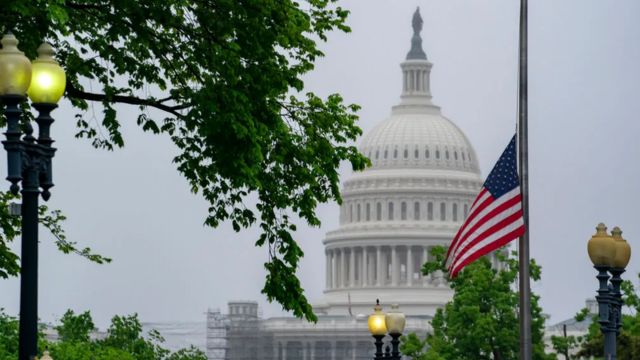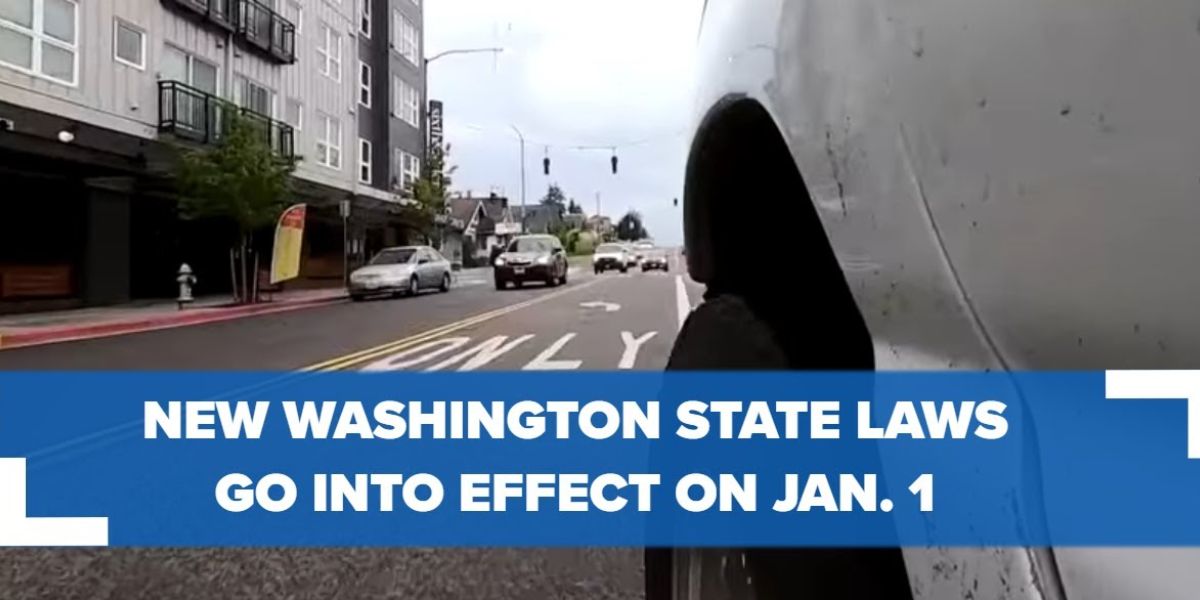WPBN: In Washington state, new legislation will take effect as the year draws to a close. Here is all you need to know about the new legislation that will take effect on January 1st, including changes to employment, workplace safety, and financial aid.
Employment Related Laws
Modifications to app drivers’ paid sick leave (SB 5793)
When local, state, or federal authorities declare an emergency, the new law allows employees and TNC (transportation network company) drivers, such as Uber and DoorDash, to take paid sick leave when their child’s school or place of care closes.
For the purposes of paid sick leave, the term “family member” has been expanded to encompass anyone who frequently resides in the employee’s home or for whom the employee provides care, such as a child’s spouse, a grandchild, or a grandparent.
The concept also applies to TNC drivers, enabling them to take sick leave in the event of an emergency involving family members. To inform companies and individuals about these changes, the Department of Labor and Industries is responsible for creating resources and carrying out outreach.
Improvements to the Stay at Work Program (HB 2127)
By boosting reimbursement levels for employers who assist workers with temporary disabilities who return to work, the new law improves the Stay at Work Program.
For a maximum of $25,000, reimbursements now cover 50% of an employee’s base pay for up to 120 workdays. The program also offers $5,000 for tools or equipment, $1,000 for clothing, and up to $2,000 for tuition and other educational costs. Payments for authorized basic skills development courses are now possible thanks to changes made to the Stay at Work Account.
For workers returning with persistent disabilities, the law provides financing for the development of basic skills such as computer literacy, English language proficiency, and other critical talents. Additionally, the maximum compensation amount for accommodations related to vocational rehabilitation and job adaptations has been raised to $10,000.
The Preferred Worker Program, which encourages firms to hire employees with disabilities, now provides a $25,000 one-time payment for ongoing employment along with increased reimbursements for salary, equipment, and clothes.
Specifying which healthcare workers may be obliged to put in extra hours (HB 2061)
The revised law eliminates references to certified practical nurses, technologists, and specialists when defining “employee” in healthcare contexts.
As a result, workers who provide clinical services or direct patient care, are paid on an hourly basis, or are covered by a collective bargaining agreement are now subject to the mandatory overtime prohibition.
Beginning on January 1, 2025, the majority of healthcare facilities will be subject to this upgrade. For some facilities, such as critical access hospitals, hospitals with fewer than 25 acute care beds, lone community hospitals, and hospitals situated on Skagit County islands, the revised definition will go into effect on July 1, 2025.
New Daylighting’ Law in California in 2025: How Will It Impact California’s Residents?
Collaborative practice of physician assistants (HB 2041)
Physician assistants (PAs) must operate under written collaboration agreements with one or more physicians, according to the legislation, which establishes the practice restrictions for PAs.
In order to guarantee that assignments are within the PA’s scope of education, training, and experience, these agreements must specify the PA’s responsibilities, oversight, and cooperation protocols.
PAs with less than 4,000 hours of postgraduate clinical experience are required to practice under supervision, whereas those with 4,000 or more hours are permitted to practice more independently as long as they fulfill certain training requirements. Furthermore, PAs with a lot of experience could keep working in underprivileged or rural areas outside of their doctor’s specialization.
The law guarantees equal coverage for services supplied by PAs and physicians by enabling health companies to pay employers directly for services rendered by PAs. The job of establishing regulations to implement these provisions falls to the Commission and the Board of Osteopathic Medicine and Surgery.

Here’s What’s Coming to Colorado: New Laws Set to Take Effect January 1
Crime & Justice
Criminalizing careless driving that kills a vulnerable person (HB 1112).
The new law creates two negligent driving charges that harm vulnerable road users. Pedestrians, bicyclists, scooter riders, skateboarders, horseback riders, moped riders, motorcyclists, wheelchair users, and farm equipment operators are susceptible road users
Initial “Negligent Driving with a Vulnerable User Victim in the first degree,” is a heinous misdemeanor. It happens when a driver irresponsibly endangers others and kills a vulnerable public user. This offense can result in 364 days in jail, a $1,000–$5,000 fine, and a 90-day driving restriction.
The offense “Negligent Driving in the second degree with a Vulnerable User Victim” is also renamed and made more serious. This offense now applies when careless driving injures a vulnerable public user.
The Washington Traffic Safety Commission will create instructional materials on the violation and sanctions.
Illinois Set to Ease Gym Membership Cancellations with New Law in 2025
Opening a hotline and tracking hate crimes and bias (SB 5427)
The new law requires the Attorney General’s Office (AGO) to run a hate crimes and prejudice incidents hotline to help victims.
The victim-centered, culturally competent, and trauma-informed hotline will be open throughout business hours. There will be access for all Washington citizens, including those with weak language skills.
If a hate crime or bias incident is reported, the hotline will ask if the victim has contacted law enforcement and share incident facts with local authorities with authorization.
Law enforcement must direct victims to the hotline, and the AGO will engage with local service providers to provide support. An advisory council will guide hotline operations and priorities. The AGO will also issue an annual hate crime and bias report starting in 2027.
The hotline will be piloted in at least three counties, including eastern Washington, by July 1, 2025, and implemented statewide by January 1, 2027.
New hope card program (HB 1766)
The new law requires the Administrative Office of the Courts (AOC) to create a “Hope Card” program with judicial and law enforcement groups.
The Hope Card, which must be a barcode or QR code, will contain important information on the detained person and the protected individual(s), including names, birthdates, physical descriptions, and protection order information.
The card will record the protection order, including case history, and have the same legal effect as the order.
Domestic abuse, sexual assault, and stalking victims can request a Hope Card from the court clerk for free for the first card and one copy starting July 1, 2025.
Say Goodbye to $1907: Big Social Security Change Hits Retirees in 2025

Financial aid
Temporary aid expansion (HB 2415)
Washington state lawmakers boosted Diversion Cash Assistance (DCA) benefits for families. Based on income and resources, the DCA program provides temporary, emergency financial assistance to TANF-eligible families in difficulty.
As an alternative to TANF, the program provides up to $2,000 per family, up from $1,500, per year for child care, housing, transportation, food, medical expenditures, and work.
Protection of consumers
Animal-tested cosmetics ban (HB 1097)
With exclusions, Washington state will ban cosmetics made or developed utilizing animal testing by the maker or its suppliers on January 1, 2025.
Cosmetics tested outside the U.S. to fulfill foreign requirements or for non-cosmetic products can be sold if the testing evidence doesn’t support their safety. Federal or state regulations may authorize animal experimentation under specific conditions, such as the absence of non-animal alternatives and a demonstrable need.
If no additional animal testing is done, the legislation authorizes the sale of products tested before 2025. Violators can be fined up to $5,000 per infraction, and local governments cannot enforce greater restrictions.
SC Education Superintendent Advocates for $50,000 Teacher Starting Salary in 2025
Health
SB 6127: Expanding HIV post-exposure prophylaxis medicines and regimens
The new rule requires hospitals to follow CDC recommendations for prescribing post-exposure prophylaxis (PEP) medications to HIV-exposed patients.
Hospitals must give a 28-day supply of PEP drugs with informed consent, unless there are medical contraindications or care quality violations.
Since 2025, non-grandfathered health plans, including public employee and Medicaid plans, cannot charge for at least one CDC-recommended HIV PEP regimen. Health plans with HSAs must determine cost-sharing amounts for tax-exempt contributions.
Health insurance and Medicaid must compensate hospitals separately for the 28-day PEP medication supply given in emergency rooms for home use.












Leave a Reply